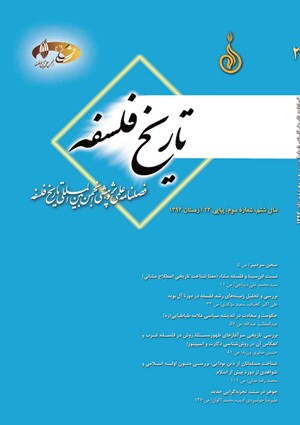جوهر در سنت تجربهگرايي جديد
محورهای موضوعی : Geneology of philosophical schools and Ideasعليرضا جوانمردي اديب 1 , محمد اکوان 2
1 - دانشگاه آزاد اسلامي
2 - دانشگاه آزاد اسلامي
کلید واژه: جوهر عقلگرايي تجربه¬, گرايي کيفيات اوليه کيفيات ثانويه لاک برکلي هيوم,
چکیده مقاله :
رويکرد معرفتي تجربه گرايي در عصر جديد در برابر رويکرد عقلگرايي دکارت و پيروان وي ـ که قائل به وجود تصورات و اصول نهادي پيش از تجربه در نهاد انسان بودند ـ قرار گرفته است. متفکران اين رويکرد با انکار تصورات و اصول نهادي و نيز سرچشمه قراردادن تجربه حسي به بررسي مسائل متافيزيکي که نزد عقلگرايان مطرح بود پرداختهاند. حاصل اين بررسيها در اوج خود درباره جوهر چيزي جز انکار آن را بارمغان نداشته است. ازاينرو با توجه به سير تحول تجربه گرايي نزد پيشروان اين رويکرد و پيامدهاي منتهي به آن، در پاسخ به پرسش بنيادين اين مقاله که آيا با پذيرش قرائت خاص تجربه گراياني همچون لاک، برکلي و هيوم از روند کسب معرفت، امکاني براي پذيرش جوهر باقي ميماند يا خير؟ بايد گفت همانطوري که در سير بررسي جوهر در نزد اين متفکران مشاهده شد پذيرش جوهر با اتخاذ رويکرد تجربه گرايي سازگار نيست چرا که جوهر يک امر فرا تجربي است که تجربه حسي صرف نميتواند بدان دست يابد. آنچه از تجربه حسي در نهايت امر برمي آيد چيزي جز مجموعهيي از تأثرات نيست که آنهم نميتواند حکايت از هستي جوهر داشته باشد.
The epistemological approach to Empiricism in the Modern era is opposed to the rationalist approach of Descartes and his followers, who believed in the existence of certain innate ideas prior to experience in Man’s mind. The thinkers advocating this approach explored rationalists’ metaphysical problems through denying innate ideas and considering sense experience as the source of knowledge. The results of such investigations had nothing to say, even at their peak, about substance except when trying to deny it. Accordingly, given the process of the development of empiricism by the pioneers of this approach and its consequences, the authors of this paper have tried to deal with the following basic question: After accepting the specific reading of some empiricists such as Locke, Berkeley, and Hume from the process of attaining knowledge, would it be possible to accept the existence of substance? Here, the writers respond that, based on their studies of the above thinkers’ views of substance, the acceptance of substance is not consistent with empiricism. This is because substance is a meta-empirical entity which sense experience cannot grasp. What follows sense experience in the end is nothing but a collection of impressions which can never explain the existence of substance.
